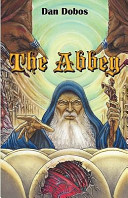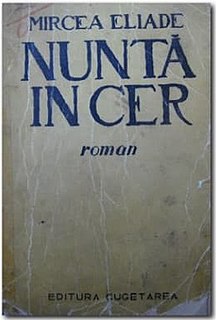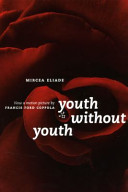 W
WThe Abbey is a science-fiction novel by the Romanian author Dan Doboș. It was first published in 2002 by Editura Nemira.
 W
WH. Bonciu, or Horia Bonciu, was a Romanian novelist, poet, journalist and translator, noted especially as an atypical figure on his country's avant-garde scene. His work, comprising several volumes of poetry and two novels, is a mixture of influences from the diverse literary schools of Europe's modernism, and, unusually in the context of Romanian literature, borrows heavily from German-born movements such as Expressionism. The autofictional and cruel detail in Bonciu's narratives makes him a senior figure among Romania's own Trăirist authors, while its capture of the unnaturally grotesque also finds him as one of the country's Neoromantics and Surrealists.
 W
WBlinding is a novel in three volumes by the Romanian writer Mircea Cărtărescu. It consists of the installments Aripa stângă from 1996, Corpul from 2002, and Aripa dreaptă from 2007. An English translation was published in October 2013.
 W
WCraii de Curtea-Veche is a novel by the inter-war Romanian author Mateiu Caragiale. Published in 1929, it took the author more than two decades to complete, and constituted his only major work.
 W
WThe Forbidden Forest is a 1955 novel by the Romanian writer Mircea Eliade. The story takes place between 1936 and 1948 in Bucharest and several other European cities, and follows a Romanian man who is on a spiritual quest while being torn between two women. The book was written between the years 1949 and 1954. It contains several elements and themes which also appear in the author's scholarly work, such as initiation rites and the division between sacred and profane time.
 W
WGod Was Born in Exile is a novel by Romanian author Vintilă Horia, for which he was awarded the Prix Goncourt in 1960, though he was never handed the prize following allegations that surfaced after his nomination that he had once been a member of the Iron Guard.
 W
WKir Ianulea or Kyr Ianulea is a fantasy and historical fiction novella or short story, published by Romanian author Ion Luca Caragiale in 1909. Borrowing the elements of a fairy tale, satire and frame story, it has become recognized as one of Caragiale's leading contributions to short prose, and is often described as one of the seminal works written by him during the last decade of his life. While its narrative structure is largely based on Belfagor arcidiavolo, a story by 16th century writer and political thinker Niccolò Machiavelli, Kir Ianulea employs additional elements such as anecdotes to evolve into a social fresco of late 18th-century Wallachia and the Ottoman-ruled Balkans as a whole. Caragiale primarily adapts Machiavelli's theme, which is a fable about the innate unreliability of women, to the realities of the Phanariote epoch, focusing his attention on the interactions between Greeks and Romanians while offering additional insight into the process of acculturation.
 W
WThe Lost Bible is a bestseller written by Igor Bergler. It is the most widely sold Romanian novel of the last 20 years.
 W
WMarriage in Heaven is a 1938 novel by the Romanian writer Mircea Eliade. It consists of the correspondence between two unhappy men: one whose lover wanted children while he did not, and one who was abandoned by a woman who did not want children while he did. The plot has autobiographical elements from Eliade's relationship with his wife Nina.
 W
WLa Medeleni is a trio of novels written by Ionel Teodoreanu. The books were set in the village of Medeleni, in Iași County, Romania. The trilogy includes: The Fickle Border published in 1925, Roads published in 1926, and Between the Winds published in 1927. Teodoreanu’s inspiration for the novels came from a mansion on the bank of the river Prut where friends from the literary world would gather. On May 21 2016, the mansion became a museum in memoriam of Ionel Teodoreanu.
 W
WMiss Christina is a 1936 novella by the Romanian writer Mircea Eliade. It tells the story of the attraction between a female strigoi—an undead human from Romanian folklore—and a young man who visits the house she haunts. An English translation by Ana Cartianu was published in 1992 as part of the Eliade omnibus volume Mystic Stories. The novella has been the basis for two Romanian film adaptations with the same title.
 W
WThe Old Man and the Bureaucrats is a 1967 novella by the Romanian writer Mircea Eliade. It tells the story of a man who is interrogated by Romania's communist authorities, and puzzles the interrogators when he tells stories of local lore. The book was published in English in 1979. Together with two other stories by Eliade it forms the basis for the 1996 film Eu sunt Adam.
 W
WThe Secret of Dr. Honigberger is a 1940 novella by the Romanian writer Mircea Eliade. It centres on the search for a 19th-century physician named Johann Martin Honigberger, who disappeared in India while searching for the invisible kingdom Shambhala, as well as his early 20th-century biographer who has also disappeared.
 W
WViaţa ca o pradă is a 1977 partly-autobographical novel by Romanian author Marin Preda.
 W
WWomen is a novel by Romanian author Mihail Sebastian. It was first published in Romanian as Femei in 1933. It was released in English in 2019 by Aurora Metro Books and Other Press. It was rereleased by Penguin European Writers in 2020.
 W
WYouth Without Youth is a 1976 novella by Romanian author Mircea Eliade. It follows the life of Dominic Matei, an elderly Romanian intellectual who experiences a cataclysmic event that allows him to live a new life with startling intellectual capacity. In 2007, it was adapted into a film by Francis Ford Coppola, also titled Youth Without Youth.